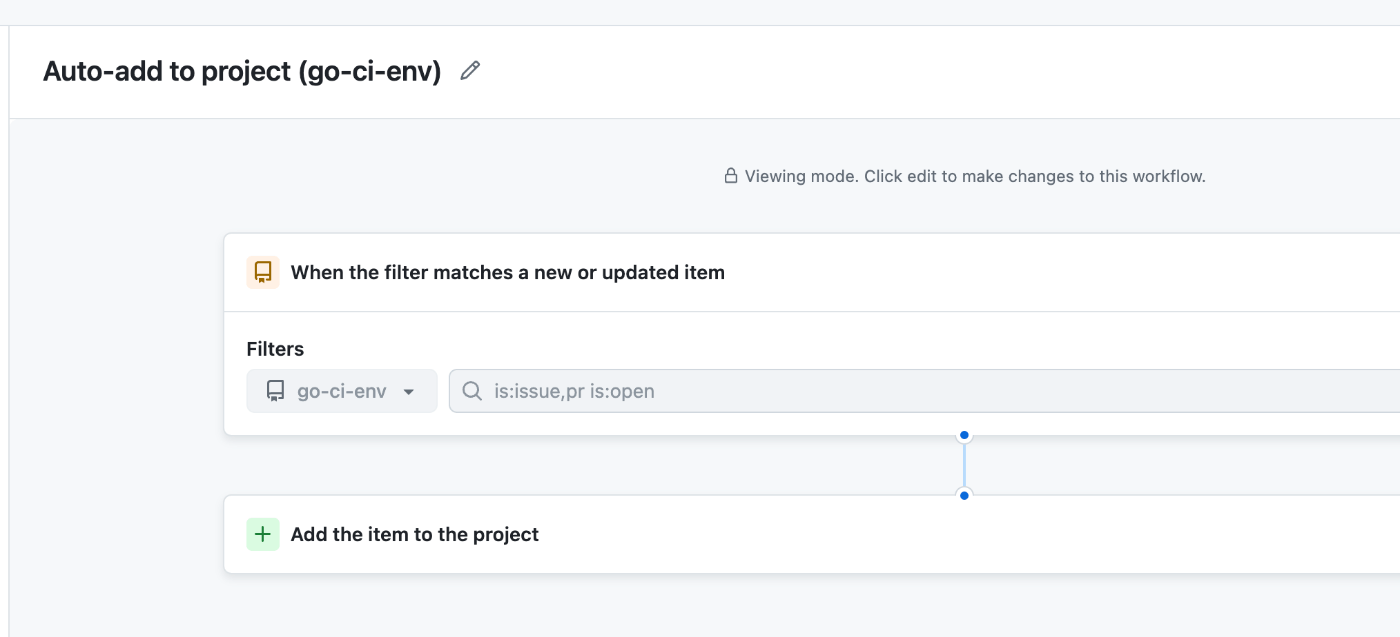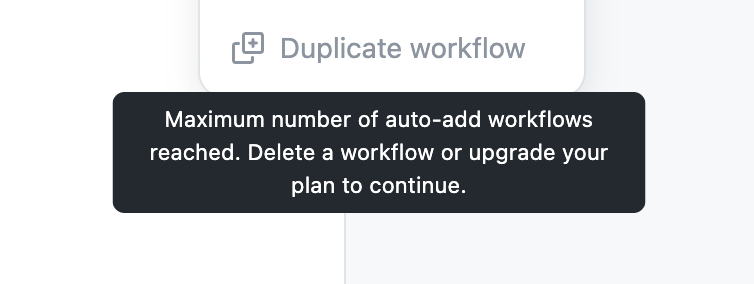Awesome
ghproj
Add GitHub Issues and Pull Requests to GitHub Projects.
Motivation
I manage a lot of OSS projects, so I have to handle a lot of issues and pull requests. So I want to manage them using a GitHub Project.
I've developed this tool to gather issues and pull requests of all my OSS in a single GitHub Project. By executing this tool periodically by GitHub Actions schedule event, you can add issues and projects to GitHub Projects automatically.
Blog Post
Install
ghproj is a single binary written in Go.
So you only need to put the executable binary into $PATH.
brew install suzuki-shunsuke/ghproj/ghproj
scoop bucket add suzuki-shunsuke https://github.com/suzuki-shunsuke/scoop-bucket
scoop install ghproj
aqua g -i suzuki-shunsuke/ghproj
- Download a prebuilt binary from GitHub Releases and install it into
$PATH
You can verify downloaded assets using some tools.
--
- GitHub CLI
ghproj >= v0.1.2
You can install GitHub CLI by aqua.
aqua g -i cli/cli
gh release download -R suzuki-shunsuke/ghproj v0.1.2 -p ghproj_darwin_arm64.tar.gz
gh attestation verify ghproj_darwin_arm64.tar.gz \
-R suzuki-shunsuke/ghproj \
--signer-workflow suzuki-shunsuke/go-release-workflow/.github/workflows/release.yaml
- slsa-verifier
You can install slsa-verifier by aqua.
aqua g -i slsa-framework/slsa-verifier
gh release download -R suzuki-shunsuke/ghproj v0.1.2 -p ghproj_darwin_arm64.tar.gz -p multiple.intoto.jsonl
slsa-verifier verify-artifact ghproj_darwin_arm64.tar.gz \
--provenance-path multiple.intoto.jsonl \
--source-uri github.com/suzuki-shunsuke/ghproj \
--source-tag v0.1.2
- Cosign
You can install Cosign by aqua.
aqua g -i sigstore/cosign
gh release download -R suzuki-shunsuke/ghproj v0.1.2
cosign verify-blob \
--signature ghproj_0.1.2_checksums.txt.sig \
--certificate ghproj_0.1.2_checksums.txt.pem \
--certificate-identity-regexp 'https://github\.com/suzuki-shunsuke/go-release-workflow/\.github/workflows/release\.yaml@.*' \
--certificate-oidc-issuer "https://token.actions.githubusercontent.com" \
ghproj_0.1.2_checksums.txt
After verifying the checksum, verify the artifact.
cat ghproj_0.1.2_checksums.txt | sha256sum -c --ignore-missing
- Go
go install github.com/suzuki-shunsuke/ghproj/cmd/ghproj@latest
Usage
ghproj init # Scaffold a configuration file ghproj.yaml
ghproj add [-config (-c) <configuration file path>] # Add issues and pull requests to GitHub Projects
Environment variables
GITHUB_TOKEN: (Required) GitHub access tokenGHPROJ_CONFIG: Configuration file pathGHPROJ_CONFIG_TEXT: Configuraiton content. This is useful if you want to manage the configuration in a GitHub Actions Workflow file
GitHub Access token
ghproj needs a GitHub access token.
You need to pass a token via environment variable GITHUB_TOKEN.
There are two options.
- (Recommendation) If you use GitHub Organization Project, you can use a
GitHub App - If you use GitHub User Project, you can use a
classic personal access token
GitHub App is much safer than classic personal access token, so we recommend the option 1.
GitHub Actions token is unavailable to manage GitHub Projects.
fine-grained personal access token is unavailable because it doesn't support GitHub Projects.
https://github.com/orgs/community/discussions/36441
There are also some APIs that do not yet support the fine-grained permission model, that we'll be adding support for in time:
- Packages
- Projects
- Notifications
GitHub App is unavailable for GitHub User Projects because the permission of GitHub User Project isn't supported.
1. GitHub App
Permissions:
Repository permissions:metadata: read-onlyOrganization permissions:Projects: Read and write
Installed repositories:
Please install the GitHub App into only a repository where ghproj is executed via GitHub Actions.
If you want to handle issues and pull requests of private repositories, permissions Pull Requests: read-only and Issues: read-only are also necessary, and you need to install the GitHub App into repositories.
2. classic personal access token
The scope read:org and project are required.
Configuration
\.?ghproj\.yaml
e.g.
entries:
- query: |
is:open
archived:false
-project:suzuki-shunsuke/5
-label:create
owner:szksh-lab
owner:lintnet
expr: |
(! Item.Repo.IsFork) &&
(Item.Title != "Dependency Dashboard") &&
! (Item.Repo.Name startsWith "homebrew-") &&
! (Item.Repo.Name startsWith "test-")
project_id: PVT_kwHOAMtMJ84AQCf4
query: GitHub GraphQL Query to search issues and pull requests which are added to a GitHub Projectexpr: An expression to filter the search result. expr-lang/expr is used. The expression is evaluated per item. The evaluation result must be a boolean. If the result isfalse, the item is excluded.expris optional
Item:
{
"Title": "issue or pull request title",
"Repo": {
"Owner": "repository owner name",
"Name": "repository name",
"IsArchived": false,
"IsFork": false
}
}
project_id: GitHub Project id which issues and pull requests are added. You can get your project id using GitHub CLIgh project list
gh project list
Archive items
You can archive items by ghproj add command.
ghproj add
ghproj.yaml
entries:
- expr: |
Item.Repo.IsArchived
action: archive
project_id: PVT_kwHOAMtMJ84AQCf4
Item:
{
"State": "CLOSED",
"Title": "issue or pull request title",
"Labels": ["enhancement"],
"Open": false,
"Author": "octokit",
"Repo": {
"Owner": "repository owner name",
"Name": "repository name",
"IsArchived": false,
"IsFork": false
}
}
Run ghproj by GitHub Actions
The workflow is executed periodically by GitHub Actions schedule event, and issues and pull requests are added to the GitHub Project.
Comparison
There are several other ways to add issues and pull requests to GitHub Projects.
- built-in automation
- GitHub Actions' issues and pull requests events
1. built-in automation
Using built-in automation, you can add issues and pull requests to GitHub Projects wihout codes, but there are several drawback.
- You have to create a workflow per repository. This is bothersome

- You can create only five (this limit seems to depend on the plan) workflows, which means you can handle issues and pull requests of only five repositories

2. GitHub Actions' issues and pull requests events
You can run GitHub Actions workflows via issues and pull requests events and add them to GitHub Projects.
GitHub provides an official action for this.
https://github.com/marketplace/actions/add-to-github-projects
The drawback of this approach is that you have to add workflows to all repositories you want to handle. You have to maintain those workflows. This is bothersome. And you have to pass secrets to all workflow runs, which means you have to manage secrets properly.